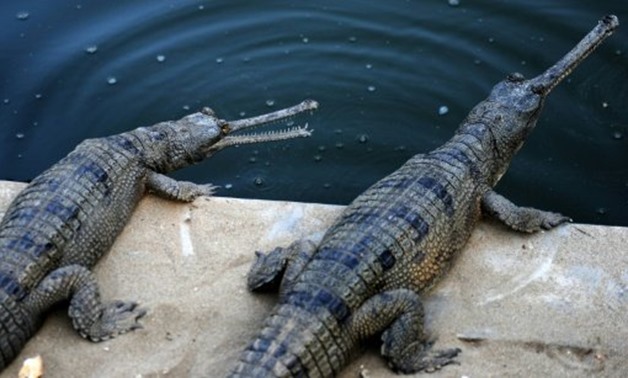
© AFP/File | Gharials are close to extinction
DHAKA - 13 Aug 2017:Bangladeshi conservationists introduced two rare river-dwelling crocodiles to potential mates Sunday in a last-ditch attempt to save the critically-endangered species from extinction.
A 36-year-old female gharial -- a fish-eating crocodile once native to rivers across the Indian subcontinent -- was brought from a zoo in northeast Bangladesh to the capital Dhaka, where it is hoped she will mate with an older male to repopulate the species.
A separate 40-year-old male was returned to the zoo in Rajshahi where there are only females.
Gharials can only breed until the age of 50 and as the small captive population in Bangladesh ages, conservationists decided intervention was needed if the species was to have any chance of survival.
"This is our last hope to rescue the critically-endangered gharial from total extinction," Sarowar Alam, who heads the International Union for Conservation of Nature's Bangladesh gharial project, told AFP.
"We're hopeful we'll get some results, even though there are fears these adults gharials may have lost the urge to mate."
Bangladesh, with its vast network of rivers, was once a key habitat for the gharial, a crocodile distinctive for its large body and long thin snout.
But today they are virtually extinct in Bangladesh and the few which are seen likely made their way downstream from India.
There has been no sighting of gharials in Bangladesh's two Himalayan rivers -- the Ganges and Brahmaputra -- in more than a decade.
The species has also all but vanished from its erstwhile habitats in Pakistan and Bhutan, with fewer than 200 existing in rivers mainly in India but also Nepal.
There are 11 captive gharials in Bangladesh, officials say, and if the breeding programme is a success it is hoped the infants can be released back into the wild.
"This is the first time we've decided to exchange the gharials among zoos so that they can mate and breed," Jahidul Kabir, the government's conservator of forests, told AFP.
The Padma and Jamuna rivers, the main tributaries of the two Himalayan rivers, have been identified as potential sanctuaries for the species should it repopulate.
Conservationists have built artificial sandbanks in the zoos for the breeding exercise. Though gharials spend most of their time in water, sandy banks are essential for building nests and basking.
Quetta's chief of bomb disposal squad, Aslam Tareen, said initial information was that a suicide attacker rammed a motorcycle into a military vehicle.
Pakistan's army press wing said the patrol was the target and there were at least seven civilians among the 15 killed.
It cited army chief General Qamar Javed Bajwa as saying terrorists were trying to disrupt Monday's celebrations of 70 years of independence from Britain.
"Our resolve won't succumb to any challenge," Bajwa was quoted as saying in an official tweet from a top military spokesman.
Separatist militants in Baluchistan have waged a campaign against the central government for decades, demanding a greater share of the gas-rich province's resources.
Taliban and other Islamist militants also operate in the province, which shares borders with Afghanistan and Iran. A U.S. drone strike killed Taliban leader Mullah Akhtar Mansour last year in Baluchistan.
The province was rocked by a series of attacks late last year that claimed over 180 lives and raised concerns about a growing militant presence, including fighters affiliated with Islamic State, which has claimed several bombings in Baluchistan.
A judicial report released after an attack on the province's lawyers left more than 70 dead criticised security provisions in the region and called for increased clampdowns on extremists.
Interviews with Baluchistan police and an internal police report viewed by Reuters described a Baluchistan-based militant network in the province's remote mountainous area of Wadh with 500-1,000 operatives led by a former military asset. However, military intelligence officials denied the Wadh network exists and the father of the alleged leader says his son is not involved with militants attacking the state.

Comments
Leave a Comment